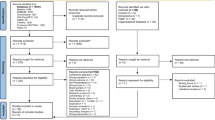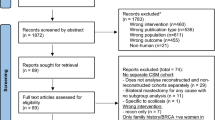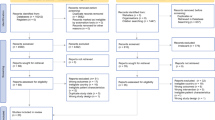Abstract
Purpose
This review aimed to determine the prevalence of met and unmet needs, and the risk factors for unmet needs among people affected by gynaecological cancer.
Methods
The review was undertaken using the PRISMA guidelines. Eligible studies were identified though a range of electronic databases in October and November 2016. Study quality was independently appraised by two people.
Results
Thirty-seven studies were included (1 review, 24 quantitative and 12 qualitative). The evidence was of mixed quality. The total burden of needs affecting women with gynaecological cancer and also their caregivers predominately related to comprehensive care and psychological concerns. The major moderate-to-high-level unmet needs of women with gynaecological cancer were for help explicitly with fear of recurrence, worries of caregivers and fatigue, and for women who developed lymphoedema were with pain and associated costs. Qualitative studies identified disease-specific needs related to sexuality issues (including fertility, sexual functioning, relationship concerns, managing vaginal changes, pregnancy care, premature menopause), genetic testing and disease-specific peer support. Women at risk of having unmet needs include those who are younger, with advanced disease, with lymphoedema or a high symptom burden, are unable to work, have mental health issues, have poor social support or live in rural or remote locations.
Conclusions
Understanding the needs of women with gynaecological cancer and their caregivers is essential to improving care and outcomes. Current data are limited thus there is a need for qualitative studies of patient-caregiver dyad and vulnerable subgroups and well-designed quantitative studies of women with each type of gynaecological and their caregivers.

Similar content being viewed by others
References
International Agency for Research on Cancer and World Health Organization (2012) GLOBOCAN 2012: estimated cancer incidence, mortality and prevalence worldwide in 2012. In: Editor (ed)^(eds) Book GLOBOCAN 2012: estimated cancer incidence, mortality and prevalence worldwide in 2012, City
Australian Institute of Health and Welfare (2012) Gynaecological cancers in Australia: an overview. In: Editor (ed)^(eds) Book Gynaecological cancers in Australia: an overview, City
Sankaranarayanan R, Ferlay J (2010) Worldwide burden of gynaecological cancer Handbook of Disease Burdens and Quality of Life Measures: 803–823
Cancer Australia (2016) National framework for gynaecological cancer control. In: Editor (ed)^(eds) Book national framework for gynaecological cancer control. Cancer Australia, City
Teskereci G, Kulakaç O (2016) Life experiences of caregivers of women with gynaecological cancer: a mixed-methods systematic review. Eur J Cancer Care (Engl)
Hui D (2014) Definition of supportive care: does the semantic matter? Curr Opin Oncol 26:372–379
Bonevski B, Sanson-Fisher R, Hersey P, Paul C, Foot G (1999) Assessing the Perceived Needs of Patients Attending an Outpatient Melanoma Clinic. J Psychosoc Oncol 17:101–118
Nelson CW, Niederberger J (1990) Patient satisfaction surveys: an opportunity for total quality improvement. Hosp Health Serv Adm 35:409–427
Moher D, Liberati A, Tetzlaff J, Altman DG (2010) Preferred reporting items for systematic reviews and meta-analyses: the PRISMA statement. Int J Surg (London, England) 8:336–341
Cancer Australia (2017) Supporting women to live well with gynaecological cancers: systematic literature review. In: Editor (ed)^(eds) Book Supporting women to live well with gynaecological cancers: systematic literature review. Cancer Australia, City
Bonevski B, Sanson-Fisher R, Girgis A, Burton L, Cook P, Boyes A (2000) Evaluation of an instrument to assess the needs of patients with cancer. Supportive care review group. Cancer 88:217–225
Steele R, Fitch MI (2008) Supportive care needs of women with gynecologic cancer. Cancer Nurs 31:284–291
Boyes A, Girgis A, Lecathelinais C (2009) Brief assessment of adult cancer patients' perceived needs: development and validation of the 34-item Supportive Care Needs Survey (SCNS-SF34). J Eval Clin Pract 15:602–606
Beesley V, Janda M, Eakin E, Obermair A, Battistutta D (2007) Lymphedema after gynecological cancer treatment : prevalence, correlates, and supportive care needs. Cancer 109:2607–2614
Hodgkinson K, Butow P, Hunt GE, Pendlebury S, Hobbs KM, Lo SK, Wain G (2007) The development and evaluation of a measure to assess cancer survivors’ unmet supportive care needs: the CaSUN (Cancer Survivors’ Unmet Needs measure). Psychooncology 16:796–804
Houts PS, Yasko JM, Kahn SB, Schelzel GW, Marconi KM (1986) Unmet psychological, social, and economic needs of persons with cancer in Pennsylvania. Cancer 58:2355–2361
Johnsen AT, Petersen MA, Pedersen L, Groenvold M (2011) Development and initial validation of the three-levels-of-needs questionnaire for self-assessment of palliative needs in patients with cancer. J Pain Symptom Manag 41:1025–1039
Somjai A, Chaipoom A (2006) Psychosocial needs of women with cancer of the reproductive system: a comparison between Buddhist and Muslim patients in Thailand. Ment Health Relig Cult 9:379–388
Bubela N, Galloway S, McCay E, McKibbon A, Nagle L, Pringle D, Ross E, Shamian J (1990) The Patient Learning Needs Scale: reliability and validity. J Adv Nurs 15:1181–1187
Girgis A, Lambert S, Lecathelinais C (2011) The supportive care needs survey for partners and caregivers of cancer survivors: development and psychometric evaluation. Psychooncology 20:387–393
Hodgkinson K, Butow P, Hobbs KM, Hunt GE, Lo SK, Wain G (2007) Assessing unmet supportive care needs in partners of cancer survivors: the development and evaluation of the Cancer Survivors’ Partners Unmet Needs measure (CaSPUN). Psychooncology 16:805–813
Hodgkinson K, Butow P, Fuchs A, Hunt GE, Stenlake A, Hobbs KM, Brand A, Wain G (2007) Long-term survival from gynecologic cancer: psychosocial outcomes, supportive care needs and positive outcomes. Gynecol Oncol 104:381–389
Rowlands IJ, Janda M, McKinnon L, Webb PM, Beesley VL (2014) Prevalence, predictors, and correlates of supportive care needs among women 3–5 years after a diagnosis of endometrial cancer. Support Care Cancer 23:1205–1214
Seven M, Sahin E, Yilmaz S, Akyuz A (2016) Palliative care needs of patients with gynaecologic cancer. J Clin Nurs 25:3152–3159
Phianmongkhol Y, Suwan N (2008) Symptom management in patients with cancer of the female reproductive system receiving chemotherapy. Asian Pac J Cancer Prev 9:741–745
Beaver K, Booth K (2007) Information needs and decision-making preferences: Comparing findings for gynaecological, breast and colorectal cancer. Eur J Oncol Nurs 11:409–416
Papadakos J, Bussière-Côté S, Abdelmutti N, Catton P, Friedman AJ, Massey C, Urowitz S, Ferguson SE (2012) Informational needs of gynecologic cancer survivors. Gynecol Oncol 124:452–457
Akkuzu G, Kurt G, Guvenc G, Kok G, Simsek S, Dogrusoy S, Ayhan A (2016) Learning needs of gynecologic cancer survivors. J Cancer Educ
Beesley V, Eakin E, Steginga S, Aitken J, Dunn J, Battistutta D (2008) Unmet needs of gynaecological cancer survivors: implications for developing community support services. Psycho-Oncology 17:392–400
Beesley VL, Price MA, Webb PM, O'Rourke P, Marquart L, Butow PN (2012) Changes in supportive care needs after first-line treatment for ovarian cancer: identifying care priorities and risk factors for future unmet needs. Psycho-Oncology 22:1565–1571
McCallum M, Jolicoeur L, Lefebvre M, Babchishin LK, Robert-Chauret S, Le T, Lebel S (2014) Supportive Care Needs After Gynecologic Cancer: Where Does Sexual Health Fit in? Oncol Nurs Forum 41:297–306
Urbaniec OA, Collins K, Denson LA, Whitford HS (2011) Gynecological cancer survivors: assessment of psychological distress and unmet supportive care needs. J Psychosoc Oncol 29:534–551
Simonelli LE, Pasipanodya E (2014) Health disparities in unmet support needs of women with gynecologic cancer: an exploratory study. J Psychosoc Oncol 32:727–734
Matulonis UA, Kornblith A, Lee H, Bryan J, Gibson C, Wells C, Lee J, Sullivan L, Penson R (2008) Long-term adjustment of early-stage ovarian cancer survivors. Int J Gynecol Cancer 18:1183–1193
Kornblith AB, Mirabeau-Beale K, Lee H, Goodman AK, Penson RT, Pereira L, Matulonis UA (2010) Long-term adjustment of survivors of ovarian cancer treated for advanced-stage disease. J Psychosoc Oncol 28:451–469
Fitch MI, Steele R (2010) Identifying supportive care needs of women with ovarian cancer. Can Oncol Nurs Jl 20:66–74
Jeppesen MM, Mogensen O, Dehn P, Jensen PT (2015) Needs and priorities of women with endometrial and cervical cancer. J Psychosom Obstet Gynecol 36:122–132
Vermeer WM, Bakker RM, Kenter GG, de Kroon CD, Stiggelbout AM, ter Kuile MM (2014) Sexual issues among cervical cancer survivors: how can we help women seek help? Psycho-Oncology 24:458–464
Beesley VL, Rowlands IJ, Hayes SC, Janda M, O'Rourke P, Marquart L, Quinn MA, Spurdle AB, Obermair A, Brand A, Oehler MK, Leung Y, McQuire L, Webb PM (2015) Incidence, risk factors and estimates of a woman’s risk of developing secondary lower limb lymphedema and lymphedema-specific supportive care needs in women treated for endometrial cancer. Gynecol Oncol 136:87–93
Butow PN, Price MA, Bell ML, Webb PM, deFazio A, Friedlander M (2014) Caring for women with ovarian cancer in the last year of life: a longitudinal study of caregiver quality of life, distress and unmet needs. Gynecol Oncol 132:690–697
Stafford L, Judd F (2010) Partners of long-term gynaecologic cancer survivors: psychiatric morbidity, psychosexual outcomes and supportive care needs. Gynecol Oncol 118:268–273
Rasmusson E-M, Thomé B (2008) Women’s wishes and need for knowledge concerning sexuality and relationships in connection with gynecological cancer disease. Sex Disabil 26:207–218
Nicolaije KAH, Husson O, Ezendam NPM, Vos MC, Kruitwagen RFPM, Lybeert MLM, van de Poll-Franse LV (2012) Endometrial cancer survivors are unsatisfied with received information about diagnosis, treatment and follow-up: a study from the population-based PROFILES registry. Patient Educ Couns 88:427–435
Toubassi D, Himel D, Winton S, Nyhof-Young J (2007) The informational needs of newly diagnosed cervical cancer patients who will be receiving combined chemoradiation treatment. J Cancer Educ 21:263–268
McCallum M, Lefebvre M, Jolicoeur L, Maheu C, Lebel S (2012) Sexual health and gynecological cancer: conceptualizing patient needs and overcoming barriers to seeking and accessing services. J Psychosom Obstet Gynecol 33:135–142
Trivers KF, Patterson JR, Roland KB, Rodriguez JL (2013) Issues of ovarian cancer survivors in the USA: a literature review. Support Care Cancer 21:2889–2898
Lloyd PA, Briggs EV, Kane N, Jeyarajah AR, Shepherd JH (2014) Women's experiences after a radical vaginal trachelectomy for early stage cervical cancer. A descriptive phenomenological study. Eur J Oncol Nurs 18:362–371
Rodríguez MAP, Suess A, Cerdá JCM, Carretero ME, Danet A (2011) Opinions and expectations of women in the treatment of cervical and uterine cancer in Spain. Women’s Health 7:709–718
Jefferies H, Clifford C (2009) Searching. Cancer Nurs 32:E30–E36
Gleeson M, Meiser B, Barlow-Stewart K, Trainer AH, Tucker K, Watts KJ, Friedlander M, Kasparian N (2013) Communication and information needs of women diagnosed with ovarian cancer regarding treatment-focused genetic testing. Oncol Nurs Forum 40:275–283
Ekwall E, Ternestedt B-M, Sorbe B, Graneheim UH (2011) Patients’ perceptions of communication with the health care team during chemotherapy for the first recurrence of ovarian cancer. Eur J Oncol Nurs 15:53–58
Ekwall E, Ternestedt B-M, Sorbe B, Sunvisson H (2014) Lived experiences of women with recurring ovarian cancer. Eur J Oncol Nurs 18:104–109
Oshima S, Kisa K, Terashita T, Habara M, Kawabata H, Maezawa M (2011) A qualitative study of Japanese patients’ perspectives on post-treatment care for gynecological cancer. Asian Pac J Cancer Prev 12(9):2255–2261
Walton LM, Reeve J, Brown PM, Farquhar CM (2010) Gynaecologic cancer patients’ needs and experiences of supportive health services in New Zealand. Psycho-Oncology 19:201–208
Lydon A, Beaver K, Newbery C, Wray J (2009) Routine follow-up after treatment for ovarian cancer in the United Kingdom (UK): patient and health professional views. Eur J Oncol Nurs 13:336–343
Acknowledgments
We thank the Project Working Group members including Chair, Professor Patsy Yates (Academic Nurse), Professor Susan Carr (Consultant, Sexual & Reproductive Health), Ms. Bronwyn Grout (Consumer Representative), Ms. Kim Hobbs (Clinical Specialist Social Worker), Dr. Laura Kirsten (Principal Clinical Psychologist), Ms. Tish Lancaster (Clinical Nurse Consultant) and Dr. Cath Shannon (Medical Oncologist) who provided expert guidance to support the achievement of the project objectives. We also thank the Cancer Australia staff including Jennifer Chynoweth, Caroline Nehill, Vivienne Milch, Felicity Hughes and Daisy Garling for their support of the Project Working Group and QIMR Berghofer Medical Research Institute in carrying out this project.
Funding
This work was funded by the Australian Government through Cancer Australia.
Author information
Authors and Affiliations
Corresponding author
Electronic supplementary material
Supplementary table
(DOCX 94 kb)
Rights and permissions
About this article
Cite this article
Beesley, V.L., Alemayehu, C. & Webb, P.M. A systematic literature review of the prevalence of and risk factors for supportive care needs among women with gynaecological cancer and their caregivers. Support Care Cancer 26, 701–710 (2018). https://doi.org/10.1007/s00520-017-3971-6
Received:
Accepted:
Published:
Issue Date:
DOI: https://doi.org/10.1007/s00520-017-3971-6




